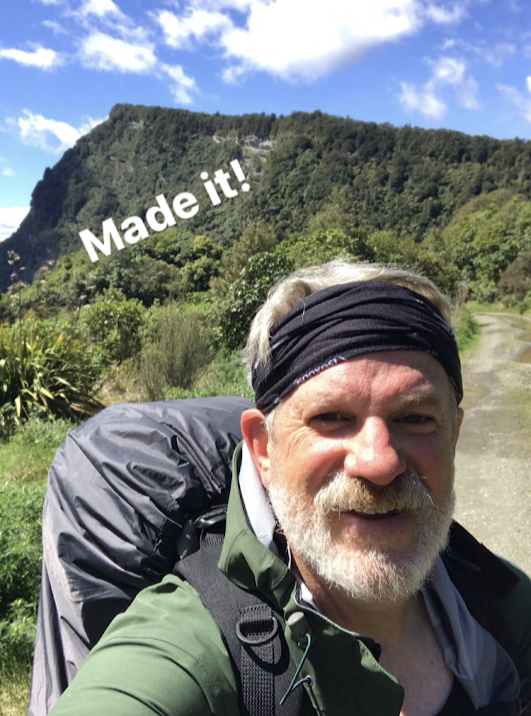Lessons from a Hike (3)
19/11/19 Filed in: Change
When I did the Waikaremoana Great Walk, I came up with 15 analogies to making life changes. I fully expected to write about all 15, but I’m ready to move on to other topics. However, I do want to focus on three more today, and then I’ll list the rest of the analogies at the end, giving you the opportunity to develop your own thoughts around them.
So far, we have looked at the following:
7. Refuse to quit. I have never considered myself to be a quitter. I’m just too stubborn, and maybe have too much pride. But I’ll tell you, I would have quit on the second day of the hike in a heartbeat if I could have! As I mentioned earlier, I had started out too quickly, with too much weight, and with too little preparation. I had fallen and broken one of my highly necessary hiking poles. I was dehydrated and therefore not eating enough. I had not slept well the first night in my cold, wet tent. My legs were constantly on the verge of cramp and collapse. And finally, I was looking at a 500 metre climb the following day. Partway through that second day, I was telling myself that as soon as I got a cell signal, I was going to call for a water taxi to come pick me up at the next stop. However, I never did get a signal. One of the fellow campers even offered to use his personal locator beacon to call for a rescue, and while I did give it a couple of seconds in thought, I realised this was not a rescue situation. I had only one option available to me – keep walking the next day.
therefore not eating enough. I had not slept well the first night in my cold, wet tent. My legs were constantly on the verge of cramp and collapse. And finally, I was looking at a 500 metre climb the following day. Partway through that second day, I was telling myself that as soon as I got a cell signal, I was going to call for a water taxi to come pick me up at the next stop. However, I never did get a signal. One of the fellow campers even offered to use his personal locator beacon to call for a rescue, and while I did give it a couple of seconds in thought, I realised this was not a rescue situation. I had only one option available to me – keep walking the next day.
I was surprised at how ready I was to quit. As I look back on it now, I’m embarrassed a bit that I was so ready to quit. I didn’t quit on that walk because I had no way of doing so. What the experience has caused me to do is to think about what I needed on that day to take away the mental desire to quit. And more importantly, how does that translate to the discussion about life changes?
In the hiking community there are a handful of suggestions in helping people avoid the quit. And they convert well to life changes.
8. Take care of yourself. That second night, once I realised I had no choice but to continue on, I took stock of what I needed. I put the focus on rehydrating myself first. That took a bit of effort: I had to get water, decontaminate it, drink it down, and then repeat the process. It sounds simple, but at this point, nothing was simple for me. It took a concerted focus. Then I needed to get some food in me. Again, it was not easy and it was the last thing I really wanted to do. But I took the time to prepare the food, sat down, and just focussed on getting the food down. I refused to stop when it got hard because I knew I needed to get some energy. Last, I needed rest! Because I’m a pretty skilled snorer (I choose to see that as a strength) I was asked to not sleep in the bunk room. Instead, I was asked to sleep in the common room – where the cooking, dining, and conversing took place. But I needed sleep. So I pulled out a mattress, asked a couple of people if they could make space for me, put in my ear plugs, and promptly fell asleep in the middle of all that. What mattered to me most that evening was that I needed to take care of myself and give myself the opportunity to continue the journey the next day.
Self-care is a buzz word in the counselling community these days, and justifiably so. Frankly, our society right now stinks at taking care of itself. We hardly ever have quiet moments that give us the opportunity to recharge. And when we do have quiet moments, what’s the first thing we often turn to? The phone and all its capabilities of providing noise and distraction to our already over stressed brain. Listen, making life changes is hard work! You NEED to take care of yourself! You need to rest and recharge. You need quiet times of reflection. If you are going to be successful in making the changes you want to make, you must take care of yourself. And it won’t always be convenient! Sometimes you just have to make it happen, regardless of how you feel or how inconvenient it may be to do so. Give yourself permission to take care of yourself. And then do it!
9. Celebrate the victories. I’ve talked about all the difficulties I had on that journey, but it did end well. I did make the 500 metre climb to the top of Panekire. The sign at the beginning of the day’s walk said that it would take me four hours to make it to the top. I did it in 3 hours 45 minutes. It was a long, rainy day where I was alone most of the time. But when I got to the top, there were four of my fellow hikers there to greet me and congratulate me for making it. Even though it was still raining and there were no views to speak of, I stood outside for a bit and just enjoyed the reality of having made it. Yes, there was still one more day to go and that would be climbing back down those 500 metres. But instead of thinking too much about that, I just celebrated the fact that I had made it to the top. The next morning, the sun was out, the views were great, and I was looking forward to another four hours of walking.
making it. Even though it was still raining and there were no views to speak of, I stood outside for a bit and just enjoyed the reality of having made it. Yes, there was still one more day to go and that would be climbing back down those 500 metres. But instead of thinking too much about that, I just celebrated the fact that I had made it to the top. The next morning, the sun was out, the views were great, and I was looking forward to another four hours of walking.
Too often, when we are in the middle of the change process, we can get so focussed on either the difficulties or the reality that we still have not achieved all of our goals, that we forget to celebrate the victories along the way. Perhaps you have gone several days without giving into your addiction. Or you responded to a stressful situation with calm rather than anger. Or you were able to journal about your feelings in a therapeutic way. Or you lost a half kilo after a week of hard work. Whatever the progress, whether it is what you would consider big or small, it is still progress! So celebrate it. Allow yourself the joy of knowing that you are still moving toward your goal. There are not many better places you can find motivation that acknowledging the progress you’ve already made. Are you giving yourself those well-deserved pats on the back?
Beyond these nine analogies, I came up with some others. Perhaps you can spend some time developing these for yourself. I would also like to encourage you to look at some of your own personal life experiences and think about what you have learned through them that you can apply to the change processes you are going through. Working from what you know to what you don’t know can be a great way of expanding your creativity in moving forward.
Here are the rest of my analogies from the Great Walk:
10. In the really hard places, just put one foot in front of the other and repeat.
11. When you fall down, get back up.
12. Find a mantra that keeps you focussed on your journey.
13. When you feel lost – stop, relax, and slowly work your way back to being found.
14. Use one positive change to set yourself up for another positive change.
15. Protect the new changes by continuing to move forward.
By the way, I completed the Walk. Here's the photo I sent to my family as soon as I finished. Look at that joy!!

So far, we have looked at the following:
- Plan all you want but there has to be a point where you just choose to start.
- Hike your own hike. Don’t compare yourself to others.
- Expect the unexpected.
- Accept that progress often involves misery.
- Get rid of excess baggage.
- Accept help from others.
7. Refuse to quit. I have never considered myself to be a quitter. I’m just too stubborn, and maybe have too much pride. But I’ll tell you, I would have quit on the second day of the hike in a heartbeat if I could have! As I mentioned earlier, I had started out too quickly, with too much weight, and with too little preparation. I had fallen and broken one of my highly necessary hiking poles. I was dehydrated and

I was surprised at how ready I was to quit. As I look back on it now, I’m embarrassed a bit that I was so ready to quit. I didn’t quit on that walk because I had no way of doing so. What the experience has caused me to do is to think about what I needed on that day to take away the mental desire to quit. And more importantly, how does that translate to the discussion about life changes?
In the hiking community there are a handful of suggestions in helping people avoid the quit. And they convert well to life changes.
- Don’t quit on a bad day. Everyone has bad days. But bad days are labelled as bad because we compare them to good days, and everyone has good days. So wait for a good day, and then decide if you want to quit. Most of the time, you won’t because the good days are far better than the bad days are bad.
- Ask yourself how you will feel in a week if you quit now. Ask yourself how you will feel in a week if you push on now. This is a good tool to remind us that what we are feeling now is only temporary. Listening to the “future you” can often move you off a quit moment in the present.
- When you feel you have come to the end of your ability, you are usually only about halfway to the real end of your ability. We live in a pretty easy world and have become accustomed to feeling relatively comfortable as a normal way of life. Pushing past the quit moment can teach us much about how much resilience we actually have!
- Remind yourself why you are doing this. When we embark on life changes, it often comes because we have had a significant moment of clarity. Remind yourself of that clarity. Recommit to why you wanted to change in the first place. Ask yourself what happens if you choose to disregard that clarity. People who quit often eventually come back to that same moment of clarity and start all over again. Remind yourself that it’s easier to push through this difficult moment than to quit and have to start all over again later.
8. Take care of yourself. That second night, once I realised I had no choice but to continue on, I took stock of what I needed. I put the focus on rehydrating myself first. That took a bit of effort: I had to get water, decontaminate it, drink it down, and then repeat the process. It sounds simple, but at this point, nothing was simple for me. It took a concerted focus. Then I needed to get some food in me. Again, it was not easy and it was the last thing I really wanted to do. But I took the time to prepare the food, sat down, and just focussed on getting the food down. I refused to stop when it got hard because I knew I needed to get some energy. Last, I needed rest! Because I’m a pretty skilled snorer (I choose to see that as a strength) I was asked to not sleep in the bunk room. Instead, I was asked to sleep in the common room – where the cooking, dining, and conversing took place. But I needed sleep. So I pulled out a mattress, asked a couple of people if they could make space for me, put in my ear plugs, and promptly fell asleep in the middle of all that. What mattered to me most that evening was that I needed to take care of myself and give myself the opportunity to continue the journey the next day.
Self-care is a buzz word in the counselling community these days, and justifiably so. Frankly, our society right now stinks at taking care of itself. We hardly ever have quiet moments that give us the opportunity to recharge. And when we do have quiet moments, what’s the first thing we often turn to? The phone and all its capabilities of providing noise and distraction to our already over stressed brain. Listen, making life changes is hard work! You NEED to take care of yourself! You need to rest and recharge. You need quiet times of reflection. If you are going to be successful in making the changes you want to make, you must take care of yourself. And it won’t always be convenient! Sometimes you just have to make it happen, regardless of how you feel or how inconvenient it may be to do so. Give yourself permission to take care of yourself. And then do it!
9. Celebrate the victories. I’ve talked about all the difficulties I had on that journey, but it did end well. I did make the 500 metre climb to the top of Panekire. The sign at the beginning of the day’s walk said that it would take me four hours to make it to the top. I did it in 3 hours 45 minutes. It was a long, rainy day where I was alone most of the time. But when I got to the top, there were four of my fellow hikers there to greet me and congratulate me for

Too often, when we are in the middle of the change process, we can get so focussed on either the difficulties or the reality that we still have not achieved all of our goals, that we forget to celebrate the victories along the way. Perhaps you have gone several days without giving into your addiction. Or you responded to a stressful situation with calm rather than anger. Or you were able to journal about your feelings in a therapeutic way. Or you lost a half kilo after a week of hard work. Whatever the progress, whether it is what you would consider big or small, it is still progress! So celebrate it. Allow yourself the joy of knowing that you are still moving toward your goal. There are not many better places you can find motivation that acknowledging the progress you’ve already made. Are you giving yourself those well-deserved pats on the back?
Beyond these nine analogies, I came up with some others. Perhaps you can spend some time developing these for yourself. I would also like to encourage you to look at some of your own personal life experiences and think about what you have learned through them that you can apply to the change processes you are going through. Working from what you know to what you don’t know can be a great way of expanding your creativity in moving forward.
Here are the rest of my analogies from the Great Walk:
10. In the really hard places, just put one foot in front of the other and repeat.
11. When you fall down, get back up.
12. Find a mantra that keeps you focussed on your journey.
13. When you feel lost – stop, relax, and slowly work your way back to being found.
14. Use one positive change to set yourself up for another positive change.
15. Protect the new changes by continuing to move forward.
By the way, I completed the Walk. Here's the photo I sent to my family as soon as I finished. Look at that joy!!

